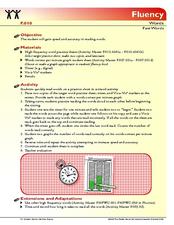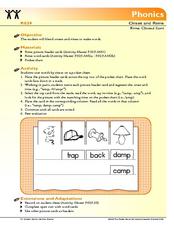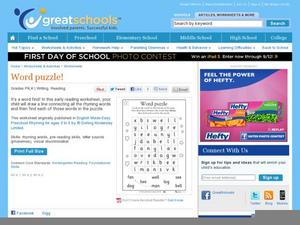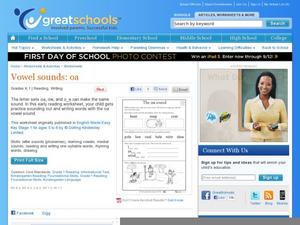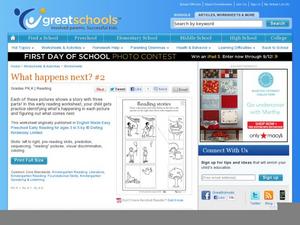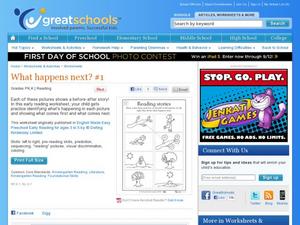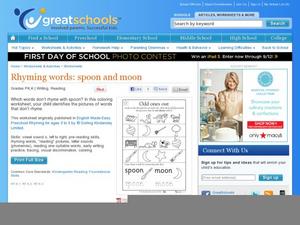Curated OER
Letters U and V
Little learners familiarize themselves with the letters u and v. They find objects in each of two pictures that begin with either v or u. They say the sound of each letter and then trace it several times.
Curated OER
Vocabulary Packet: Multiple Approaches
Looking for a complete vocabulary and spelling packet focused on high frequency words? Look no further. This printable packet includes six worksheets with activities to reinforce spelling and vocabulary competency. Learners complete a...
Florida Center for Reading Research
Fluency: Words, Speedy Rime Words
Learners time each other as they read as many rime words as possible.
Florida Center for Reading Research
Fluency: Words, Fast Words
Taking turns, pre-readers time each other as they read high-frequency words.
Florida Center for Reading Research
Phonics: Onset and Rime, Rime Closed Sort
Practice onset and rime with this word sort activity. Beginning readers lay out the four picture cards along the top of the chart: fan, cap, tack, and lamp. Then, they flip word cards and sort them beneath the image with the same rime....
Curated OER
Match the Rhymes
Focus on the short u sound in this rhyme worksheet for emergent readers. Learners examine images surrounding a jug, drawing lines to connect it to those that rhyme (bug, rug, mug). Then, they practice their printing by tracing the...
Curated OER
Find the Letters
It's an alphabet treasure hunt in this beginning spelling activity. Learners examine eight jumbled letters inside a picture of a dog, circling the letters in the word dog. Then, they do the same for the word hat. An advantage to this...
Curated OER
The oo Sounds
Investigate spelling patterns that make the /oo/ sound in this labeling worksheet. Scholars read a brief introduction explaining the different vowel pairings that make the long /oo/ sound, along with word examples. Then, they write words...
Curated OER
Word Puzzle
Add some fun to rhyming using a word puzzle learning exercise. First, learners match up single-syllable rhyming words. Then, they find all the words in a word search. This beginning reading activity only has words spelled horizontally...
Curated OER
Draw it Yourself
Here are four familiar pictures and words for emerging readers: dog, mouse, cat, and hen. After examining the image and spelling, they draw something that rhymes with each in the space provided. Encourage pre-readers to sound out words...
Curated OER
Missing Letters
As your youngsters begin learning to read, use visual worksheets like this to help them tie objects to words. Scholars examine six images labeled with a word. Each word is missing a first letter, and they must use one of the letters at...
Curated OER
The oa Sound
Explore spelling patterns with this multi-step activity featuring the /oa/ sound. Learners read a brief introduction explaining that this sound can be achieved by three different vowel combinations. They complete a different activity as...
Florida Center for Reading Research
Phonological Awareness: Phoneme Isolating, The Last Sound Is...
Partners work with real objects as they practice final phonemes. Here's how it works: Partner A silently chooses an object and sounds it out, determining the final phoneme and saying the sound aloud. Partner B examines the group of...
Curated OER
What's Outside?
Learners determine whether the objects shown are inside or outside. They check the box that is near objects that are located outside of something. They then draw candies outside of a jar.
Curated OER
Odd One Out
Letters q-z are the topic of the worksheet. Learners circle the picture in each row that does not make the initial letter sound indicated. They then fill in the letter that is missing from the beginning or ending of four words.
Curated OER
Reading Comprehension: My Lucky Day
Tell a story using pictorial representations as textual support. Special education pupils reading at an elementary level will enjoy identifying characters and other story elements while increasing their vocabulary with their handy PECS...
Curated OER
What's the First Letter? (A to H)
Here are eight words, and each of them is missing a letter. Not just any letter but the first letter. Oh my! Put your phonics masters to work and have them determine which of the eight letters (a-h) completes each word.
Curated OER
What's in Front?
Front and back are common prepositions. Early readers will practice understanding relative positions while using common prepositions by placing a check next to objects in front. Then they draw a cat in front of the house. Tip: Discuss...
Curated OER
Punctuation: Quotation Marks, Question Marks, and Exclamation Marks
There are four children pictured, each is saying a different phrase. It's up to you and your first graders to complete each phrase by adding proper punctuation. Read the dialogue-driven passage, then read what each child is saying,...
Curated OER
What Happens Next: 2
What happens next? That is a great question that requires learners to think about the sequence of events then make a prediction. They assess the pictures on the left and draw lines to the pictures on the right that show what will happen...
Curated OER
What Happens Next? 1
Knowing how to sequence events means you have to know what happens before and after. Little ones draw a line from four before images to the images that show what happened next. This is a good challenge for your youngest learners.
Curated OER
Reading Practice: Winnie-the-Pooh
Whether your first graders can read or not, they will enjoy this comprehension activity. They read or listen to an excerpt from a Winnie-the-Pooh story, they predict what will happen next, then draw Pooh Bear's favorite food. A compare...
Curated OER
Rhyming Words: Spoon and Moon
One of these things is not like the other, one of these things does not belong. It's true! Little learners will say each of the four words in each of four rows, to determine which one does not rhyme with the others. After that, they...
Curated OER
Syllables
How many syllables? This practice activity starts with a brief introduction on segmenting words, encouraging kids to say words aloud. They categorize 12 words into lists based on number of syllables: one, two, or three. Next, scholars...





